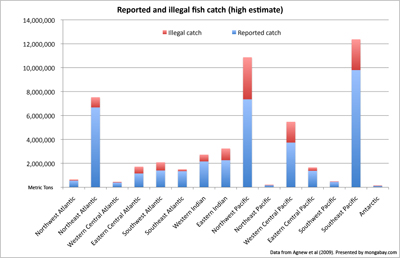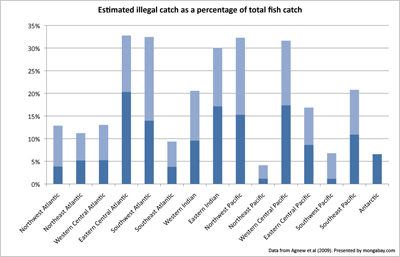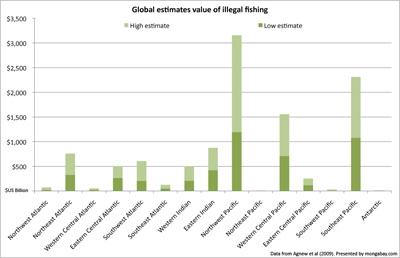Global losses from illegal and unreported fishing are estimated at $10-23.5 billion per year, according to a new study published in PLoS One.
Analyzing fishing data from 54 countries, David J. Agnew of Imperial College London and colleagues estimate the “Illegal, Unreported and Unregulated” (IUU) fish catch at 11 to 26 million tons per each year. The authors found a strong link between governance and illegal fishing — illicit practices were most widespread in developing countries with poor monitoring and law enforcement. Estimated catches in West Africa were 40 percent higher than reported catches.
“This is the first time, to our knowledge, that a significant relationship has been demonstrated on a global scale between the level of illegal and unreported fishing and indices of governance, and it points to the benefits of improving governance,” the authors write. “This is not to say that developing countries with poor governance records are necessarily to blame for illegal fishing, but that they are more vulnerable to illegal activities, conducted by both their own fishers and vessels from distant water fishing nations.”
“In Africa, for instance, many coastal states license vessels from distant water fishing nations such as China, Taiwan, Korea, the EU and Russia to fish in their waters, and there is a significant illegal fishing problem from many of these vessels.”
The authors note that illegal fishing is an important driver of overfishing, which depletes the marine resource base and has ecological impacts.
“Illegal and unreported fishing can have very significant effects on stocks. For instance, unreported catches of bluefin tuna from the Mediterranean… have significantly contributed to the rapid decline in the stock, and a failure by the European Union to control unreported catches led to a failure to generate any recovery in North Sea cod until very recently,” they write. “There is a correspondence between our regional estimates of illegal and unreported fishing and the number of depleted stocks in those regions. For instance out of 53 demersal stocks recognized in the eastern central Atlantic, 32 of which could be assessed, 60% were overexploited in the early 2000s compared to 30% of EU stocks and 15% of New Zealand stocks. Thus out of these three areas those with the highest and lowest proportion of depleted stocks also had the highest and lowest levels of illegal fishing.”
 Reported and unreported (high estimate) fish catch per year. Click image to enlarge. |
“Illegal fishing creates significant collateral damage to ecosystems. Illegal fishing, by its very nature, does not respect national and international actions designed to reduce bycatch and mitigate the incidental mortality of marine animals such as sharks, turtles, birds and mammals.”
The authors do find some evidence of progress: 11 areas saw reductions in illegal fishing since the early 1990s.
Read this paper at PLoS ONE
CITATION: Agnew DJ, Pearce J, Pramod G, Peatman T, Watson R, et al. 2009 Estimating the Worldwide Extent of Illegal Fishing. PLoS ONE 4(2): e4570. doi:10.1371/journal.pone.0004570

